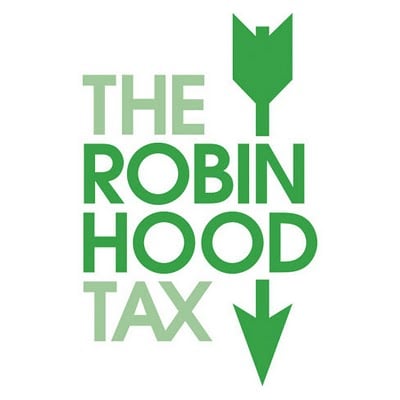
Robin Hood Tax[edit | edit source]
The Robin Hood Tax is a proposed series of taxes, which if approved, would be payable by financial institutions when doing business with one another. The idea is currently being proposed by a campaigning group in the United Kingdom and supported by associates around the world. The group, consisting largely of non-governmental organizations, sees it as a way to raise money to protect public services and to tackle climate change and poverty.
Origin[edit | edit source]
The term 'Robin Hood Tax', was first coined by the charity War on Want in 2001 as a currency transaction tax. The name comes from Robin Hood, a character from English folklore who supposedly 'took from the rich to give to the poor.' The current U.K campaign began in 2010.
Campaigners[edit | edit source]
The campaign to have the Robin Hood Tax introduced is being supported by a coalition of over 100 charities, NGO's, faith organizations and advocacy groups such as Oxfam, Barnado's, Salvation Army and Tearfund. World leaders such as President Sarkozy of France, Chancellor Merkel of Germany and Prime Minister Zapatero of Spain are behind the idea, as are prominent business people such a FSA Chairman Lord Turner, financier George Soros and entrepreneur Warren Buffet. In April 2011, one-thousand economists wrote to G2O ministers in support of the tax, signatories included Jeffrey Sachs, director of the Earth Institute at Columbia University who is an influential adviser to Ban Ki-moon, the secretary general of the United Nations; Dani Rodrik from Harvard, and Ha-Joon Chang, from Cambridge. There is also support at a grass roots level; the organization's website claims there are campaigns in twenty-five countries with millions of supporters.
Specifics[edit | edit source]
The proposal recommends three different forms of revenue: Financial Transaction Tax, Bank Levy, and Financial Activities Tax.
Financial Transaction Tax (FAT)
This is the major tax which is being promoted and involves a tax of approximately.05% on transactions such as derivatives, foreign currency, stocks and bonds. It is estimated that this tax could raise £250 billion per year.
Bank Levy
A flat rate levy to be imposed on large financial institutions. Campaigners are unhappy with the current levies imposed by the U.K, France and Germany. The current U.K levy; introduced by the government in January 2011 has ben described by campaigners as "missing the mark." They claim the £2.5 billion raised anually is insufficient and that the money is not being distributed to those in need.
Financial Activities Tax A tax on excess profit and renumeration similar to the VAT tax in the European Union. It is claimed by campaigners that this could raise £3.9 Billion annually in the U.K and $93 billion among OECD countries.
Beneficiaries[edit | edit source]
Specific information on exactly where the money will be spent is hard to come by however the Robin Hood Tax official website has some broad information. According to the website the money would be split as follows:
50% to fight poverty in the U.K Avoiding housing benefit cuts, alleviating child poverty, insulating homes, and funding public services.
25% to fight poverty in developing countries Putting every child on earth in school, providing free health care, helping in disaster zones.
25% to fight to fight climate change at home and abroad Funding education campaigns, prevention techniques and environmentally sustainable technology.
Use of Social Media[edit | edit source]
Social media has been utilized by campaigners to help promote the Robin Hood Tax. Facebook is the primary tool. The Robin Hood Tax Facebook group has 248,680 members. Members can view content, policy, updates and news posted by the group administrators and other members. It provides a platform for communication, collaboration, co-operation and connection. Recruitment and exposure to the campaign is facilitated by the connectedness of Facebook. The Robin Hood Tax Youtube Channel has sixty-seven videos uploaded. These videos provide information about the campaign, news, interviews and more. The discussion through comments on the individual videos allows for ongoing dialogue among the audience. As of May 9, 2011, the videos have been viewed by nearly 800,000 people. The Robin Hood Tax Twitter account focuses on the use of micro blogging. The account is updated regularly with news, related information, links, and multimedia. It is currently being followed by 6,489 people.
Criticisms of Robin Hood Tax[edit | edit source]
Critics argue that introduction of the Robin Hood Tax could provide a competitive disadvantage for banks. Telegraph reporter Toby Young suggests that while the tax is a "brilliant idea", it will not be accepted by one nations banks unilaterally for "...fear of placing its own banking sector at a competitive disadvantage." He suggests that as soon as that legislation is passed in one nation all international banks with a headquarters in that country would simply relocate elsewhere to a country where the transactions were not taxed. This would weaken, rather than strengthen the economy.
Higher unemployment has been stated as a potential unintended consequence of the Robin Hood Tax. An increase in taxes on banks could lead to less transactions meaning less business and resulting in people losing their jobs. This is contradictory to the whole idea of reducing poverty.
Sources[edit | edit source]
- http://www.guardian.co.uk/business/2011/apr/13/robin-hood-tax-economists-letter
- http://robinhoodtax.org/
- http://www.facebook.com/robinhoodtax?sk=app_7146470109
- http://twitter.com/#!/robinhood
- http://www.youtube.com/user/RobinHoodTax
- http://blogs.telegraph.co.uk/news/tobyyoung/100025643/a-robin-hood-tax-is-a-terrible-i-mean-brilliant-idea/